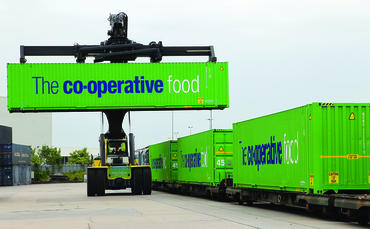3-9-2014 | For many businesses, sustainability is still a nice-to-have, a luxury that can be invested in to boost their reputation, but discarded when times get tough. But if done well, the opposite is true and green investments can become an imperative for a corporate as it struggles to keep its head above the water.
This is perhaps nowhere more true than for the Co-operative Group, who won BusinessGreen Leaders’ Transport Project of the Year at the BusinessGreen Leaders 2014 awards, in spite of its well-documented travails.
Thanks to a wide range of investments, Co-op’s food distribution unit slashed its diesel consumption by 1.2 million litres and greenhouse gas (GHG) emissions by 3,826 tonnes CO2 equivalent last year. As a result, its efficiency initiatives are now generating annual savings of £71m, insulating the business from future energy price rises, and providing an encouraging bit of good news for an organisation that has generated more than its share of negative headlines in recent months.
Speaking to BusinessGreen, Justin Kirkhope, project manager for Logistics Strategy at The Co-operative Group, said energy efficiency remains a key part of the company’s strategy, particularly after the Group announced last month that it was selling its farm business to Wellcome Trust, placing an even sharper focus on the food, funeral, insurance, and financial divisions that remain in its charge.
“We’ve got some really good support from the top, from our CEOs,” Kirkhope reflects. “This is core to our values so although investment decisions have been really tough we get support. But as you would expect the business challenge is any request for capital.”
It is during the past 12 months that the Co-operative Food’s investments have really started to pay off, particularly as the company finalised a major overhaul of its disjointed food distribution network, closing six inefficient distribution centres and opening two new custom-built centres in Bristol and Derbyshire.
Unlike some other large retailers, the Co-op model has been built from the ground up over many years. Some stores are located in broadly inaccessible locations and there is no real one size fits all model. But this challenging starting point has forced the logistics team to look carefully at how it can optimise efficiency.
Investing in new technology has been a key part of the improvements it has delivered. For example, the new distribution centres and trucks can hold food at a variety of temperatures, allowing the Co-op to close down its dedicated frozen distribution centre and reduce the number of deliveries to stores. It has also invested in software that allows it to map the best routes and schedules for each store.
“Some of the modelling we’ve done has enabled us to ensure that the right stores are getting deliveries from the right centres,” adds Kirkhope. “This was a final optimisation that gave us a step change in the number of delivery miles we were doing.”
The group has also rolled out a highly innovative “backhaul” programme which means each of the 2,800 food stores send waste back to a central location where it is managed responsibly – recycled, reused or even sent to anaerobic digestion. This has already halved Co-op Food’s waste bill from over £5m per year to around £2m.
Co-op says this new programme has required an unprecedented co‐ordination of effort between store colleagues and the logistics team, and has yet to be replicated by any of its competitors. “It’s setting new standards in waste management,” adds Kirkhope. “Not only by diverting our waste away from landfill, but also by converting it into a valuable resource, an approach we believe to be unique amongst our competitors.”
But the changes do not stop there; the Co-op Group has embraced rail freight to the best of its ability, saving more than one million road miles and 570 tonnes of CO2e as a result. At the moment, one quarter of its Scottish deliveries travel by rail and it is seeking partnerships with other retailers to expand the rail logistics programme.
But Kirkhope fears that rail will continue to prove unattractive to many unless the industry can tackle the technological challenges that rail freight faces. While lorries have become more fuel efficient and bigger, rail containers are lagging behind. “We said that we wouldn’t put a foot in the water [with rail freight] unless it was cheaper than or breaking even with the road alternative,” he says. “It is for the traffic we’re moving, but the difficulty is that road innovation is improving all the time. Rail just needs to keep that momentum.”
So until rail catches up, Co-op is continuing to invest in new trucks, including piloting eight “longer semi‐trailers” that have 18 per cent more capacity and four aerodynamically shaped “dolphin” trucks that promise to enhance fuel efficiency and curb emissions.
With a broad range of measures at its fingertips and all of them paying off and offering further potential savings, Co-op’s logistics team seems to have proved itself an essential part of the group as it attempts to drive itself to recovery.
Source: BusinessGreen

